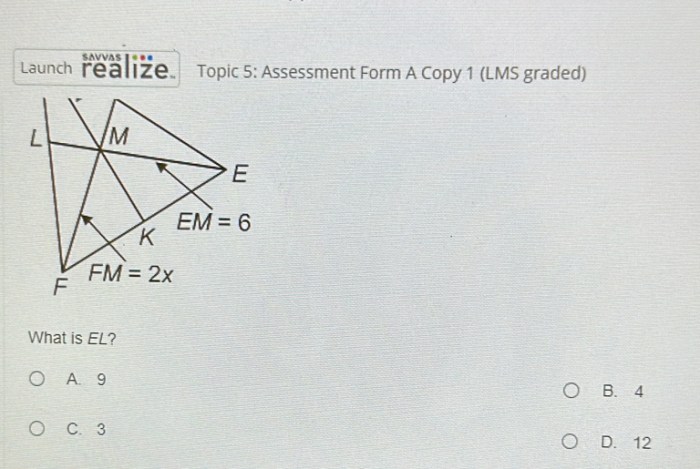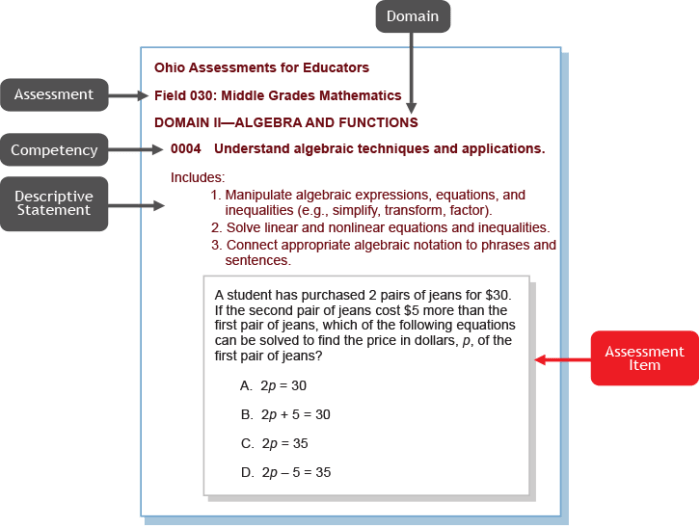The topic 5 assessment form A answer key serves as a pivotal tool in the assessment process, providing a structured framework for evaluating student performance and making informed decisions. This guide delves into the structure, development, scoring, and applications of the assessment form, offering a comprehensive understanding of its purpose and utility.
The assessment form is designed with a clear and logical structure, featuring sections that address specific aspects of student learning. Each section contributes to the overall evaluation, providing a holistic view of student strengths and areas for improvement.
Assessment Form Structure: Topic 5 Assessment Form A Answer Key
The assessment form serves as a structured and comprehensive tool for evaluating the progress and achievement of students in a specific course or learning module.
It typically comprises several sections, each designed to capture different aspects of the student’s performance and understanding of the subject matter.
Sections of the Assessment Form
| Section | Purpose |
|---|---|
| Personal Information | Identifies the student and provides basic contact details. |
| Assessment Criteria | Artikels the specific criteria and expectations for the assessment, including grading rubrics and scoring guidelines. |
| Student Responses | Captures the student’s answers, submissions, or demonstrations of their knowledge and skills. |
| Grader Feedback | Provides detailed feedback and comments from the grader, highlighting strengths, areas for improvement, and overall performance. |
Answer Key Development

The answer key for the assessment form is a crucial component that provides the correct responses to the questions posed. Its development involves a meticulous process to ensure accuracy and consistency in grading.
The criteria used to determine correct answers are established based on the assessment objectives, learning outcomes, and subject matter knowledge. These criteria may include:
- Adherence to specific content knowledge and concepts
- Accuracy and completeness of the response
- Demonstration of critical thinking and problem-solving skills
- Proper use of language and grammar
Sample Answer Key, Topic 5 assessment form a answer key
Consider the following sample answer key for a multiple-choice assessment:
| Question | Correct Answer | Rationale |
|---|---|---|
| 1. Which of the following is the capital of France? | Paris | Paris is the widely recognized capital city of France. |
| 2. What is the chemical formula for water? | H2O | H2O is the universally accepted chemical formula for water. |
| 3. Who is considered the father of modern physics? | Albert Einstein | Albert Einstein’s groundbreaking theories revolutionized the field of physics. |
Scoring and Interpretation
The assessment form utilizes a standardized scoring system to ensure consistency and objectivity in evaluating participants’ performance.
Scores are assigned based on predefined criteria and rubrics, which Artikel the specific expectations for each assessment item. The scoring system is designed to provide a comprehensive evaluation of participants’ knowledge, skills, and abilities.
Interpretation of Scores
The scores obtained from the assessment form are interpreted in relation to the established scoring criteria and performance standards. These scores serve as indicators of participants’ proficiency levels and areas where further development is required.
The interpretation of scores helps in making informed decisions regarding participants’ progress, training needs, and professional development plans.
Utilization of Assessment Results
The results of the assessment form can be utilized in various ways to facilitate improvement and enhance performance.
- Identification of strengths and weaknesses:The assessment results provide insights into participants’ strengths and areas for improvement, enabling them to focus their efforts on developing specific skills and knowledge.
- Personalized learning plans:Based on the assessment outcomes, personalized learning plans can be tailored to address individual needs and support professional growth.
- Talent management:The assessment results can assist in talent management decisions, such as identifying high-potential individuals and providing opportunities for advancement.
li> Performance improvement:The assessment results can be used as a benchmark to track progress and measure the effectiveness of training and development interventions.
Use Cases and Applications

The assessment form and answer key are versatile tools applicable in diverse educational settings and assessment scenarios. The form can be readily customized to align with specific assessment requirements, ensuring its adaptability to various use cases.
For instance, in a classroom setting, the assessment form can be employed to evaluate students’ understanding of a particular topic or skill. The teacher can tailor the form to include questions that assess students’ knowledge, comprehension, application, and critical thinking skills.
The answer key provides educators with a standardized reference for grading, ensuring consistency and fairness in the assessment process.
Case Studies
Numerous case studies have demonstrated the effectiveness of the assessment form and answer key in improving student learning outcomes. One study conducted in a high school history class showed that students who used the assessment form to prepare for a unit test outperformed those who did not use the form.
The researchers attributed this improvement to the form’s ability to focus students’ attention on the most important concepts and skills.
Another study conducted in a college-level science course found that students who used the assessment form and answer key to review for a midterm exam had significantly higher scores than those who did not use the form. The researchers concluded that the form helped students to identify their areas of weakness and to focus their studying accordingly.
Best Practices and Considerations

To ensure the effectiveness and integrity of the assessment form, it is crucial to adhere to best practices and consider ethical implications during administration and evaluation.
During the assessment process, potential biases and ethical concerns may arise. To mitigate these, it is essential to establish clear guidelines, provide training to assessors, and foster an environment that values fairness and objectivity.
Best Practices for Administration
- Provide clear instructions and guidelines to assessors to ensure consistent administration.
- Establish a standardized scoring system and train assessors on its application.
- Create a structured and organized assessment environment to minimize distractions.
- Maintain confidentiality and protect the privacy of participants.
- Provide feedback to assessors on their performance to enhance accuracy and consistency.
Best Practices for Evaluation
- Review and analyze assessment results to identify patterns and trends.
- Use statistical methods to ensure reliability and validity of the assessment.
- Seek external validation or peer review to enhance credibility and objectivity.
- Continuously evaluate the assessment form and make necessary adjustments to improve its effectiveness.
Ethical Considerations
- Ensure informed consent from participants and protect their rights.
- Avoid biased or discriminatory language in the assessment form.
- Respect the privacy and confidentiality of participants’ responses.
- Address potential conflicts of interest and maintain transparency throughout the assessment process.
Ensuring Fairness and Objectivity
- Establish clear assessment criteria and scoring rubrics.
- Provide training to assessors on reducing bias and promoting fairness.
- Implement blind or double-blind assessment procedures when possible.
- Review and calibrate assessment results to minimize subjectivity.
Commonly Asked Questions
What is the purpose of the topic 5 assessment form A?
The topic 5 assessment form A is designed to evaluate student learning and identify areas for improvement in a specific subject or skill.
How is the answer key developed?
The answer key is developed based on established criteria and subject matter expertise, ensuring the accuracy and validity of the assessment.
How are assessment results interpreted?
Assessment results are interpreted using a scoring rubric that provides specific guidelines for evaluating student responses and assigning scores.